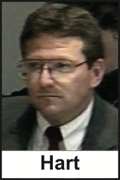Dec. 2, 2011
 “Videotaped interviews made during the early cases (alleging day care ritual sex abuse) show that when children were allowed to speak freely, either they had nothing to say about abuse or they denied it ever happened to them.
“Videotaped interviews made during the early cases (alleging day care ritual sex abuse) show that when children were allowed to speak freely, either they had nothing to say about abuse or they denied it ever happened to them.
“Once it became obvious that these records would prevent guilty verdicts, prosecutors began advising investigators not to keep tapes or detailed notes of their work.”
– From “Satan’s Silence: Ritual Abuse and the Making of a Modern American Witch Hunt” by Debbie Nathan and Michael Snedeker (1995)
Perhaps the most significant difference in the two largest abuse trials was that McMartin defense attorneys were able to expose to jurors the prosecution therapists’ manipulative interview techniques, while Little Rascals attorneys were stymied by the premeditated unavailability of original documentation.
“After Bob Kelly’s indictment,” according to an article in the ABA Journal, “Bill Hart, a North Carolina deputy attorney general assigned to the case, traveled to Los Angeles to consult with McMartin prosecutors.
“He learned that McMartin jurors had criticized videotapes of therapist Kee McFarlane’s interviews with the children. She asked leading questions and rebuked children who did not tell of abuse….”
Hart could have brought back to North Carolina the lesson that interviewers shouldn’t “(ask) leading questions and (rebuke) children who did not tell of abuse.” Instead, he brought back the lesson that interviewers should leave no evidence of having used exactly those fraudulent techniques.
